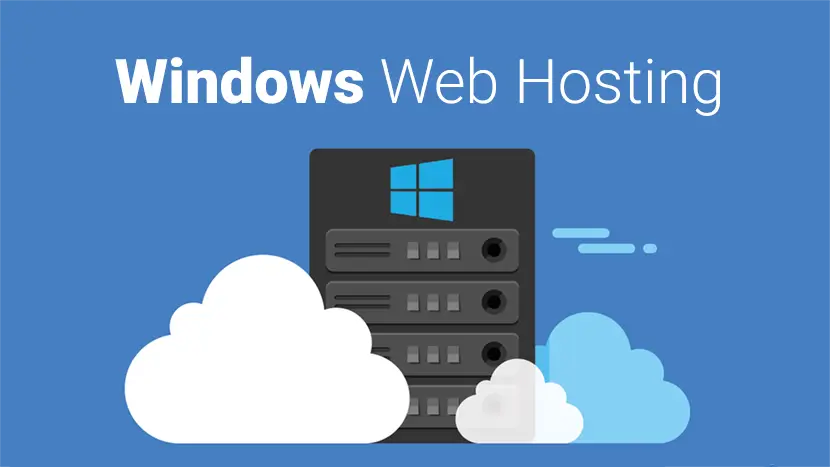What is Windows Web Hosting?
Last updated on January 19, 2025 by RGB Web Tech

The necessity of having a dynamic website with visually attractive elements has now become an essential factor for many individuals. Windows web hosting is one of the most popular and feature-rich services offered by hosting companies that meet these needs markedly.
Generally speaking, there are two main options available for web hosting: Windows and Linux. Windows hosting with its dynamic technology can help you stay ahead of the competition with eye-catching pages that run smoothly.
What Is Windows Hosting Meaning?
It is typically a web hosting server that runs by the Windows OS or its other variants. Your website pages can efficiently have access to web development features of Windows when you use a hosting service of this kind.
The popularity of Windows as an operating system around the world has paved the way for windows hosting meaning to become hugely favorable among website owners. Currently, more than 75% of the desktop operating system’s global market belongs to Windows. Microsoft is continually researching this product, and we can see the improvements it makes on Windows every year not only in the technical aspects but also in support of various scripts.
Advantages of Windows Web Hosting Hosting
When you are looking for a hosting solution, you will come across numerous options. Windows hosting holds a prominent place among them. If you are looking for a feature-rich hosting solution, you may take a look at this type of hosting. However, it is better to evaluate its pros and cons before you proceed.
1. A Microsoft-Friendly Option
Many websites and businesses rely on different products and tools of Microsoft like FrontPage and ASP to function properly. The same conditions apply to Microsoft Exchange for efficient management of emails and Microsoft SharePoint for better collaboration between team members.
These products offer excellent quality and have proved to be the best option in their category. For instance, ASP is much easier to use than other server-side services and integrates perfectly with many other languages as well.
Therefore, windows shared hosting counts as a perfect solution for this purpose that provides you with enough capabilities to build dynamic and interactive websites. Moreover, many tech professionals are accustomed to maintaining and updating windows and its programs. This familiarity with Windows OS makes it easy for them to work with the server interface, too.
2. Powerful and Simple
Windows hosting services are often based on Windows Server OS. This operating system enables you to manage your server and scale it without any concerns about its security.
Additionally, these windows website hosting packages come with the user-friendly Plesk control panel that makes it much easier for you to update your website and make changes where needed. The intuitive interface of Plesk, with its great focus on commercial websites, lets you manage multiple sites conveniently. Plus, it’s completely compatible with the most popular content management systems, including WordPress and Joomla.
Above all, all the Microsoft products are developed in a way to support one another. This advantage has attracted developers towards creating various applications in complete compatibility with Windows. Similarly, open-source tools like MySQL and PHP run efficiently on this hosting platform, and this feature isn’t available on Linux to this extent.
3. A Reasonable Solution
It used to be a costly service due to the high price of Microsoft licenses. However, these days you can find affordable plans as low as $10 a month from different service providers. Although Windows hosting packages are costlier than Linux, compared to the features you receive in return for the budget, you can rest assured that your money is spent well.
4. It Runs on Windows Operating System
Most of us are familiar with Windows operating system which windows shared hosting runs on it. Hence, you don’t have to go through the struggle of getting used to it. In other words, you don’t have to go through a lengthy learning curve while you are trying to work with this hosting solution. You will find specific features, which you can use according to your preferences. On these plans, you will discover the Plesk control panel. This delivers an intuitive experience than cPanel, which you can find in Linux hosting.
5. It Is Compatible With Other Windows Tools
One of the main reasons why people go for this type of hosting is the presence of numerous familiar tools. This makes life easy for them when managing the hosting plan. For example, if your website is developed with ASP.NET, Windows hosting would be a great solution available to consider. On the other hand, you will notice how compatible your hosting plan with Microsoft SQL is. You might even be able to use Microsoft Exchange as the email server.
6. It Comes With a Plesk Control Panel
As mentioned earlier, hosting windows server comes with a Plesk control panel. You can access straightforward controls on this control panel. Hence, managing your hosting plan will never be a challenging thing. If you want to make any changes or updates to your website, you can easily do them. You will even be able to manage multiple domains and websites in your hosting solution without a problem.
Disadvantages of Windows Hosting
1. It Is Not Secure as Linux Hosting
When you make a cross-comparison between the security of Windows hosting and Linux hosting, you will notice some significant differences. In other words, Linux hosting is more secure. Windows hosting solutions are highly vulnerable to numerous attacks, including ransomware attacks. However, Linux hosting is more confident, and you will keep peace of mind. Since security is a significant concern, you must be mindful of this fact as you pick a hosting solution.
2. It Is Expensive
You will have to spend more money to get this type of hosting when compared to Linux hosting. However, this varies depending on the hosting solutions provider. For example, if you look at Hostgator, you will notice that Linux hosting plans start at $2.75 per month, whereas Windows hosting plans start at $4.76 per month. You will be able to save money in the long run by going ahead with Linux hosting.
3. It Is Less Stable
Linux servers are well-known for their dependability. They seldom need to be restarted and can perform many tasks at once. On the other hand, Windows servers have difficulty running many programs and processes simultaneously without crashing. Like any other web technology, Windows servers have improved over time and are anticipated to continue to do so. However, they aren’t relatively as constant in their performance as Linux servers.
However, this is another area where selecting the appropriate web hosting company may make a significant impact. When a Windows hosting business offers a 99.9% uptime guarantee, it means they’ve taken all the necessary steps to keep their Windows servers running as smoothly as possible. A competent web hosting company can assist overcome the gap in server stability between Windows and Linux hosting by paying attention to maintenance and planning.
Who Should Choose Windows Web Hosting Server?
Windows hosting, compared to its Linux counterpart, has many areas with exceptional strength that makes it a perfect match for a hosting service. It’s essential for some web programming languages and scripts such as ASP, Visual Basic, and C# to work seamlessly.
Additionally, it supports commonly-used databases like SQL and MS Access so that you won’t have any difficulty managing your database.
Frequently Asked Questions
Does Windows Hosting Support WordPress?
One of the common questions among users is “can you host WordPress on a Windows server?“. Microsoft provides a set of tools and a robust platform that is capable of hosting WordPress. One of the most important things about Microsoft’s web platform is its interface. The Microsoft Windows server family provides several roles which can take control of complicated IT tasks.
Does Windows Hosting Support PHP?
The answer is yes. Most shared hosting services of windows support PHP by default. If PHP is not enabled on your host, you should ask your hosting provider to activate it for you.
Conclusion
We know what is windows web hosting. Windows shared hosting is an excellent option for a broad range of requirements. Although you will need to pay more money compared to the Linux solution, the efficiency and advantages of windows web hosting will outweigh its costs. So if you want high functionality and integration with popular applications, don’t hesitate to go for this service.
List of Windows Hosting Service Providers:
Read More : You can explore here 30+ Best Web Hosting Providers 2023
Video - Best Web Hosting For Small Business
Affordable Website Hosting for your domainIf you found this article helpful, we encourage you to share it on your social media platforms—because sharing is caring! For more information about article submissions on our website, feel free to reach out to us via email.
Send an emailWritten by RGB Web Tech
Latest Technology Trends
Latest technology trends shaping the future, including AI advancements, blockchain innovation, 5G connectivity, IoT integration, and sustainable tech solutions. Explore breakthroughs in quantum computing, cybersecurity, augmented reality, and edge computing. Stay ahead with insights into transformative technologies driving innovation across industries and revolutionizing how we live, work, and connect.
What is VPS Hosting? - Virtual Private Server
Last updated on January 19, 2025 by RGB Web Tech

A VPS ( Virtual Private Server ) is a virtual machine sold as a service by an Internet hosting service. The virtual dedicated server (VDS) also has a similar meaning.
A virtual private server runs its own copy of an operating system (OS), and customers may have superuser-level access to that operating system instance, so they can install almost any software that runs on that OS. For many purposes it is functionally equivalent to a dedicated physical server and, being software-defined, can be created and configured much more easily. A virtual server costs much less than an equivalent physical server. However, as virtual servers share the underlying physical hardware with other VPSes, performance may be lower, depending on the workload of any other executing virtual machines.
How does VPS work?
If you’re familiar with VMware or Virtualbox, you’ll be familiar with how VPS hosting works. These programs let you run what are known as virtualized operating systems from one machine. For example, your computer might be running OS X, but you could run different systems such as Linux or Windows XP without having to reconfigure or restart your computer.
VPS web hosting environments work in the same way as a virtualized operating system in the sense that one server will run numerous, one of a kind virtualized OS’s on a single server -since each virtualized system behaves as though it is a dedicated server. Virtualization is possible through a hypervisor. A hypervisor is computer hardware, software or firmware that creates and runs virtual machines (VM) by separating the underlying physical hardware from a computer’s operating system and applications. The computer system on which the hypervisor runs is known as a host machine, and each VM is called a guest machine.
The hypervisor provides each guest machine (each website using the VPS) with a virtual operating system and takes care of managing and executing guest operating systems. This process makes the most effective use of computer resources such as network bandwidth, memory space and processor cycles. For this reason, a hypervisor also goes by the name of a virtual machine monitor (VMM).
VPS hosting relies on a hypervisor to take resources from the physical server and provide each website with access to an emulated server (the VM). These physical servers are often held in a data center and divided equally between several virtual compartments (known as server virtualization). Each compartment is rented out, and server software is set-up on them separately so that each unit is capable of functioning as an independent unit. Each individual VPS is called a container, and the server each container is held within is known as a node.
With VPS, you benefit from many of the advantages of a dedicated server for a significantly lower cost. It offers more privileges within the OS and allows users to install any type of software capable of running on that OS. Each virtual server’s software is installed separately, enabling independent functionality for all users.
Defined amounts of CPU time and memory are shared throughout all the accounts sharing the server space. So, despite the fact that there might be far bigger websites than yours on another VPS compartment powered by the same server, that doesn’t matter. You are guaranteed the system resources you are paying for.
VPS is a step up for most users, but you'll also benefit by knowing a bit more about the technology. When your website is stored on a VPS, you are solely responsible for setting up, maintaining and running the server yourself. Handling an internet server is not an easy task! It involves taking care of security patches, server configuration, software updates, and so on. Unless you have the degree of technical skills required, it is going to tricky, and for this reason, there are two versions of VPS hosting – managed VPS and unmanaged VPS.
There are different types of VPS Hosting
Unmanaged VPS
With unmanaged VPS, your web hosting takes over installing the operating system, and you as the site owner take over managing various aspects of the server such as:
- Installing software, your control panel and taking care of software updates.
- Monitoring for security threats, installing security patches and fixing error messages.
- In the event of an outage or hardware failure you won’t get much if any support from your host.
- Configuring and maintaining your server including any upgrades you might want to see.
- You take over the responsibility of setting up your sites backup services.
This is recommended for site owners who have a technical background.
Managed VPS
Site owners with less technical acumen or a smaller staff can benefit from managed VPS. With managed VPS hosting, IT professionals lighten your load by keeping your server running correctly and taking care of your virtual server. Here’s what you should expect from a web hosting provider:
- Initial server setup : When you launch your site with a VPS there are a few steps to take in order to set the server up including installing your control panel, server software and installing any applications and your operating system. A managed host will take care of this.
- Updates : Similarly, all applications and OS updates, and ongoing fine tuning of the server will be handled for you.
- Security Patches : Security patches for your OS and core server software are installed and updated, on your behalf.
- Monitoring : Monitors for early warning signs of hardware failure and malicious attack.
- Automated Backups : In the event anything goes wrong with your site, you can retrieve it back to an earlier version.
Check with your VPS hosting provider to see what levels of management they offer. Some have greater flexibility, like Namecheap; we offer Self-Managed, Managed, Fully Managed and Emergency Assistance.
The tradeoffs between managed and unmanaged hosting are cost vs flexibility. While unmanaged services are, naturally, far cheaper than managed plans, there’s a snag - you need to have the tech know-how to run and maintain a server, or be prepared to hire someone to keep it running smoothly and safe from potential attacks.
What are the benefits of VPS Hosting?
The main merits of VPS servers is that they give you the freedom of having your own virtual machine just like you would from a more expensive, dedicated server with performance that can allow you to handle moderate traffic with the occasional heavy spike.
- Customization : Since you have your own OS, with a VPS, you can customize it to your needs. For example, if you have your own instances of server applications from PHP, to MySQL, or Apache, you can customize them so that the server fits your needs.
- Control : Offers the ability to oversee a hosting environment. Also, if you plan to install applications that need you to perform a system restart to finalize the installation, you can do this without affecting anyone else, at any time. Even though you share a VPS server with others, yours can be restarted without disrupting others.
- Cheaper : More affordable than a dedicated server.
- Dedicated resources : With a VPS Server, you have a predefined amount of RAM available to you whenever you need it. In contrast to shared web hosting, where there could be others sharing your server that could eat up the RAM when you want it most!
- Scalable : Another great thing about VPS is that you can purchase the resources you think you will need, and if that’s insufficient, you can simply increase its size.
Virtual Private Server Pros and Cons
VPS hosting can be an ideal solution for you if that’s the service you really need. Below, you can read the pros and cons of running a virtual private server.
Pros
- It’s faster and more reliable than a shared hosting server.
- As server resources such as memory or processing power are guaranteed, there’s zero to minimal fluctuation in available resources.
- Issues and traffic surges of other server users don’t affect your site.
- You get superuser (root) access to your server.
- You have better privacy, as your files and databases are locked from other server users.
- It’s an easy-to-scale service. As your website grows, you can easily upgrade your server resources (RAM, CPU, disk space, bandwidth, etc.).
Cons
- It’s more expensive than shared hosting.
- It requires more technical knowledge to setup your VPS, though there are a lot of tutorials available online.
- Server management is more technically demanding than shared or cloud plans.
- Improperly configured servers may lead to security vulnerabilities.
Do I need VPS hosting?
There are use cases for every type of hosting, so who exactly is VPS hosting for? You should consider VPS hosting if:
- Your business is expanding beyond the constraints of shared hosting.
- You are expecting a substantial increase in site traffic within the next few months. For example, your site is geared toward a new marketing effort or promotional campaign, or if you’re expanding into other markets.
- You might have enough bandwidth to handle a single website, but two, three? If you plan on hosting several websites in the near future you’re going to need more resources. Similarly, if your current shared hosting account is eating through the resources and your host is asking you to consider upgrading, it’s time to consider VPS.
- Your website needs better privacy and performance compared to what’s available with shared hosting.
- You want full control over the server, things like custom configurations, root access and installations unavailable with shared hosting.
Conclusion
VPS style hosting is the best way to keep up the success of any site going through rapid growth and expansion. It’s the next best plan that can afford some form of scalability. With VPS, not only will you enjoy a tremendous amount of storage and bandwidth (that’s entirely yours), it’s a cost effective solution to meeting the demands of a busy site. Of course we’ve mentioned dedicated hosting, which for most will be a vast amount of resources you may not need, and you’ll pay significantly more for it.
When deciding between the type of VPS, consider how hands on you want to be, or whether you are able to employ someone else to do the heavy lifting for you. If you like the sound of running your own server, go for unmanaged VPS, if on the other hand you’d like some help with server maintenance, automated backups and software updates, opt for the managed version. When it comes to choosing a VPS host.
Namecheap has the most optimized VPS hosting plans, we provide three types of VPS management: self-managed, managed (which includes root access) where we provide assistance with the additional configuration of core services to meet the specific requirements of each site. We can also help to optimize the server performance. We offer constant monitoring of all services on the server to prevent any of them from being down, and the ability to take immediate actions to resolve the issue in the case sudden downtime occurs. Our fully managed service plans (when root access is granted to Namecheap) includes all the features of the managed option including extras such as priority support and weekly backups.
List of VPS (Virtual Private Server) Service Providers:
Read More : You can explore here 30+ Best Web Hosting Providers 2023
Video - Best Web Hosting For Small Business
Affordable Website Hosting for your domainIf you found this article helpful, we encourage you to share it on your social media platforms—because sharing is caring! For more information about article submissions on our website, feel free to reach out to us via email.
Send an emailWritten by RGB Web Tech
Latest Technology Trends
Latest technology trends shaping the future, including AI advancements, blockchain innovation, 5G connectivity, IoT integration, and sustainable tech solutions. Explore breakthroughs in quantum computing, cybersecurity, augmented reality, and edge computing. Stay ahead with insights into transformative technologies driving innovation across industries and revolutionizing how we live, work, and connect.





